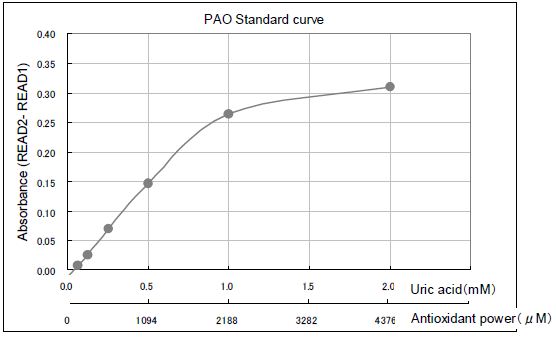Total Antioxidant Capacity (PAO) Test Kit
Product Code:
JAI-KPA-050
JAI-KPA-050
Regulatory Status:
RUO
RUO
Target Species:
Human
Human
Shipping:
AMBIENT
AMBIENT
Storage:
+20°C
+20°C
No additional charges, what you see is what you pay! *
| Code | Size | Price |
|---|
| JAI-KPA-050-1Kit | 1 Kit | £765.00 |
Quantity:
Prices exclude any Taxes / VAT
Stay in control of your spending. These prices have no additional charges to UK mainland customers, not even shipping!
* Rare exceptions are clearly labelled (only 0.14% of items!).
* Rare exceptions are clearly labelled (only 0.14% of items!).
Multibuy discounts available! Contact us to find what you can save.
This product comes from: Switzerland.
Typical lead time: 10-14 working days.
Contact us for more accurate information.
Typical lead time: 10-14 working days.
Contact us for more accurate information.
- Further Information
- Documents
- References
- Related Products
- Show All
Further Information
Detection Type:
Colorimetric
EClass:
32160000
Form (Short):
liquid
Handling Advice:
Do not freeze.
Long Description:
Kit. In the PAO assay kit, an easy and convenient method to measure antioxidant capacity is provided. Utilizing the reduction of cupric ion (Cu++ to Cu+), antioxidant capacity of samples can be detected in 5 minutes. Samples are mixed with Cu++ Solution. Cu++ are reduced by antioxidants to form Cu+. Reduced Cu+ react with Chromatic Solution (Bathocuproine), and can be detected by absorbance at wavelength 480 to 490 nm. Antioxidant capacity can be calculated from the Cu+ formed. PAO can detect not only hydrophilic antioxidants such as Vitamin C, glutathione, but also can detect hydrophobic antioxidants such as Vitamin E. Applicable for assessment of total antioxidants of serum, foods and beverage samples. Range: 21.9 - 4378 µmol/L (cupric ion reducing power). Oxidative stress plays on important role in various diseases and aging. The control of oxidative stress is expected to be useful to prevent diseases and aging.Oxidative stress is caused by the imbalance between reactive oxygen species (ROS) and antioxidant defense system. For accurate assessment of oxidative stress, measurement of ROS, oxidative damage and antioxidant activity may be essential. Recently, antioxidants as functional foods which scavenge ROS attract a great deal of attentio.
Package Type:
Box
Product Description:
Oxidative stress plays on important role in various diseases and aging. The control of oxidative stress is expected to be useful to prevent diseases and aging.Oxidative stress is caused by the imbalance between reactive oxygen species (ROS) and antioxidant defense system. For accurate assessment of oxidative stress, measurement of ROS, oxidative damage and antioxidant activity may be essential. Recently, antioxidants as functional foods which scavenge ROS attract a great deal of attention.
Range:
21.9 - 4378 µmol/L (cupric ion reducing power)
Sample Type:
Plasma, Serum
Specificity:
In the PAO assay kit, an easy and convenient method to measure antioxidant capacity is provided. Utilizing the reduction of cupric ion (Cu++ to Cu+), antioxidant capacity of samples can be detected in 5 minutes. Samples are mixed with Cu++ Solution. Cu++ are reduced by antioxidants to form Cu+. Reduced Cu+ react with Chromatic Solution (Bathocuproine), and can be detected by absorbance at wavelength 480 to 490 nm. Antioxidant capacity can be calculated from the Cu+ formed. PAO can detect not only hydrophilic antioxidants such as Vitamin C, glutathione, but also can detect hydrophobic antioxidants such as Vitamin E. Applicable for assessment of total antioxidants of serum, foods and beverage samples.
Transportation:
Non-hazardous
UNSPSC Category:
Chemical Reagent Kits
UNSPSC Number:
41116104
Documents
References
Restored Antioxidant Capacity Parallels the Immunologic and Virologic Improvement in Children with Perinatal Human Immunodeficiency Virus Infection Receiving Highly Active Antiretroviral Therapy: M. Martino, et al.; Clin. Immunol. 100, 82 (2001) | Effect of epoetin on HO-1 mRNA level and plasma antioxidants in hemodialysis patients: L.A. Calo, et al.; Int. J. Clin. Ther. 41, 187 (2003) | Oxidative stress-related factors in Bartter's and Gitelman9s syndrome: relevance for angiotensin IIsignalling: L.A. Calo, et al.; Nephrol. Dial. Transplant. 18, 1518 (2003) | Vitamin E-coated dialyzers reduce oxidative stress related proteins and markers in hemodialysis ? a molecular biological approach: L.A. Calo, et al.; Clin. Nephrol. 62, 355 (2004) | Oxidative stress and its association with coronary artery disease and different atherogenic risk factors: C. Vassalle, et al.; J. Int. Med. 256, 308 (2004) | Oxidative imbalance and cathepsin D changes as peripheral blood biomarkers of Alzheimer disease: A pilot study: E. Strafacea, et al.; FEBS Lett. 579, 2759 (2005) | Antioxidant capacity as a reliable marker of stress in dairy calves transported by road: P. Pregel, et al.; Vet. Rec. 156, 53 (2005)
Related Products
| Product Name | Product Code | Supplier | |||||||||||||||||||||||||||||||||||||||||||||||||||||||||||||||||||||||||||||||||||||||||||||||||
|---|---|---|---|---|---|---|---|---|---|---|---|---|---|---|---|---|---|---|---|---|---|---|---|---|---|---|---|---|---|---|---|---|---|---|---|---|---|---|---|---|---|---|---|---|---|---|---|---|---|---|---|---|---|---|---|---|---|---|---|---|---|---|---|---|---|---|---|---|---|---|---|---|---|---|---|---|---|---|---|---|---|---|---|---|---|---|---|---|---|---|---|---|---|---|---|---|---|---|---|
| Calcium Colorimetric Assay Kit (o-Cresolphthalein-Complexone Method) | JAI-CCA-030 | JaICA | Summary Details | ||||||||||||||||||||||||||||||||||||||||||||||||||||||||||||||||||||||||||||||||||||||||||||||||
| Iron Colorimetric Assay Kit (Ferrozine Method) | JAI-CFE-005 | JaICA | Summary Details | ||||||||||||||||||||||||||||||||||||||||||||||||||||||||||||||||||||||||||||||||||||||||||||||||
| Iron Colorimetric Assay Kit (Nitroso-PSAP Method) | JAI-CFE-010 | JaICA | Summary Details | ||||||||||||||||||||||||||||||||||||||||||||||||||||||||||||||||||||||||||||||||||||||||||||||||
| Magnesium Colorimetric Assay Kit (Yyridil Blue-I Method) | JAI-CMG-035 | JaICA | Summary Details | ||||||||||||||||||||||||||||||||||||||||||||||||||||||||||||||||||||||||||||||||||||||||||||||||
| Zinc Colorimetric Assay Kit | JAI-CZN-001 | JaICA | Summary Details | ||||||||||||||||||||||||||||||||||||||||||||||||||||||||||||||||||||||||||||||||||||||||||||||||



